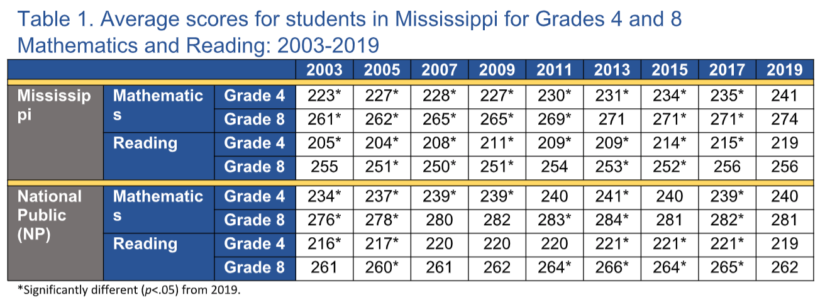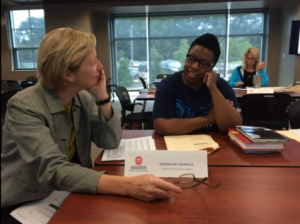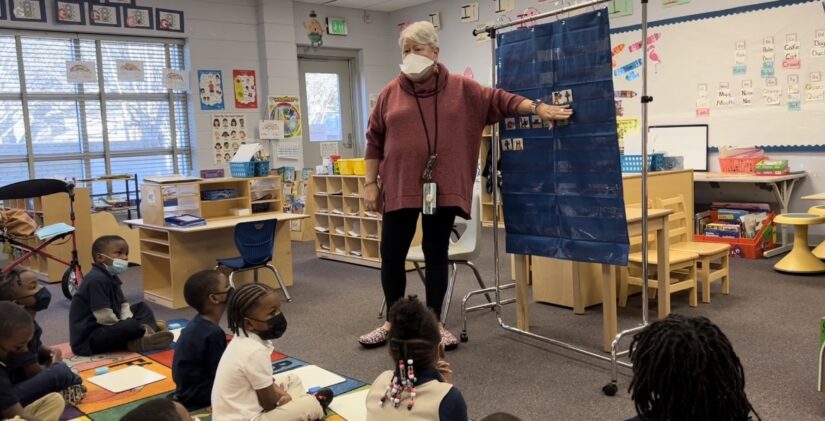After Steering Mississippi’s Unlikely Learning Miracle, Carey Wright Steps Down
By accepting hard truths and embracing accountability, the nation’s poorest state became a national exemplar in math and reading growth
By Kevin Mahnken | June 20, 2022The 2019 data release from the National Assessment of Educational Progress didn’t offer news of much progress.
The test, administered in schools biannually since 1969, had shown only lackluster academic growth in most states for over a decade. The latest scores suggested more of the same, with meaningful declines in fourth- and eighth-grade English. Peggy Carr, then the associate director of the National Center for Education Statistics, observed that improvement was so meager that “students who are struggling the most at reading…are where they were nearly 30 years ago.”
There was a somewhat startling upside, though. Two jurisdictions, Washington, D.C., and Mississippi, attained some of the highest scores in the history of their participation. And while education reformers have hailed the nation’s capital as a mecca for innovation, with generous per-pupil funding to match, Mississippi’s historically dismal achievement and gnawing racial achievement gaps were long the target of scorn.
But the 2019 results put an end to the snickers. Through the 2010s, when national data offered only rare bright spots amid prolonged stagnation, Mississippi fourth graders charged from the back of the pack to the national average in both math and reading. While eighth graders enjoyed more modest success, their recent gains in math were among the largest of any state. And best of all, the prosperity was shared: Black and Hispanic students, including those from low-income families, made huge strides alongside their white and middle-class peers.

Carey Wright, Mississippi’s superintendent of schools since 2013, had already seen student performance climb on state assessments for multiple years. Still, her advisors cautioned her to wait for confirmation from NAEP, a nationally representative exam with a high benchmark for proficiency. When that evidence finally came, she said, people in the state were “blown away.”
“It was like, ‘Oh my God, oh my God — that’s so fantastic! And this is Mississippi!’”
The transformation of one of America’s poorest and least-educated states into a fast-rising powerhouse took most outsiders by surprise. In reality, Mississippi’s emergence in 2019 resulted from a generation of groundwork in both schools and state government, with incremental gains coming along the way. Under Wright’s supervision, the Mississippi Department of Education introduced massive changes to instruction and adopted rigorous new learning standards. State lawmakers pushed through a raft of new education bills, including a controversial mandate to hold back third graders who cannot read on grade level. And now, with the COVID era receding and Wright set to retire at the end of this month, bigger and richer states are looking to Mississippi as a model.
“It’s not that they changed their test some year or played some game that made their scores look better. We’ve seen a lot of that kind of thing, and I’ve learned to be super-skeptical,” said Timothy Shanahan, an internationally recognized expert on reading and an emeritus professor at the University of Illinois at Chicago. “When you get these kinds of gains over this period of time, something real must be going on.”
Rachel Canter, a former teacher who founded the advocacy group Mississippi First in 2008, said that the state’s remarkable success is partially attributable to its celebrated overhaul of reading pedagogy. But hard-won improvement has mostly come from accepting hard truths and embracing accountability, she added.
“If you go back 20 years and look at what our state required children to know and be able to do, it was practically meaningless. Over a 20-year-period, we have gone through — in fits and starts — periods of improving our standards; improving our assessments to measure those standards; and then saying, ‘OK, still not good enough.’”
‘An abysmal failure’
Canter began her career in education in 2004 as a Teach for America corps member in the Mississippi Delta. A native Mississippian who grew up in the relatively well-off college town of Starkville, she was shocked by the level of deprivation in her host community, where close to 100 percent of all students are poor and African-American.
The signs of failure were everywhere: dilapidated desks handed down since the 1950s, a chaotic “activity schedule” that frequently preempted math courses, and despairing attitudes among some teachers toward even the possibility of improvement. Canter, a middle school English teacher, frequently taught students who couldn’t read.
“They were functionally a second or third grader, but they could float along and end up in seventh grade,” she remembered. “And it’s like, ‘You’re now three to four years behind. What do you do in a single year?’ That was what made me realize that I couldn’t solve this problem as a classroom teacher.”
At that time, perhaps the loudest voice in Mississippi’s advocacy and policy environment belonged to the Barksdale Reading Institute, founded in 2000 with the aim of gradually lifting the state’s reading performance through strategic partnerships with K-12 schools and colleges. One of its first moves was to pay for a dozen faculty members to introduce evidence-based literacy practices in Mississippi’s eight public teacher training programs.
But the intractability of the problem was revealed in a 2003 report written by Kelly Butler, a former classroom teacher: teaching candidates in pre-literacy courses received an average of about 20 minutes of total phonics instruction. The finding was particularly galling given the consistent recommendation of experts that children in early grades be exposed to phonics as a critical building block for reading.
“It was an abysmal failure because we had no impact on teacher preparation,” lamented Butler, who now serves as the institute’s CEO. “Faculty didn’t know the science. One of the findings was that they really didn’t influence each other. And there was no requirement of what they had to teach.”
The scattered focus on teacher preparation matched Mississippi’s infamously weak approach to setting academic expectations. In a 2007 study of comparative learning standards across 48 states, Mississippi’s were ranked at the bottom, such that a “proficient” reading score on its statewide exam would count as a failing mark in Massachusetts.
In response to persistent criticism, Mississippi joined 45 other states in adopting the Common Core State Standards in 2010. By this time, partly in response to Barksdale’s report, the state licensing board also required pre-service teachers to complete six hours of courses on the science of reading. But the state’s education system hadn’t overcome its reputation for shoddiness — well-known not just in policy circles, but also the business community. Young workers’ lack of skills had become a major liability in Mississippi’s ongoing campaign to attract jobs.
“[Employers] are drawn to places where there was good education and an educated workforce,” said Phil Bryant, Mississippi’s governor from 2012 to 2020. “And they would verbalize that to me: ‘We won’t come to Mississippi unless you do a better job of educating the workforce.’”
Political shift
After years of somewhat meandering progress, it was a political shift that changed the game in Mississippi.
A 20-seat swing in the 2011 round of legislative elections gave the GOP control over the state House of Representatives. Bryant won office the same day, making him Mississippi’s first Republican governor to enjoy unified control over government in nearly 150 years. According to Canter — who, by this point, was formally lobbying legislators as the head of Mississippi First — the consequence was less an ideological shift than a collection of “new faces in these positions of power.”
“That opened the door to…conversations that nobody had really been having before, because these were people who were looking to make their name on something and say, ‘This is my issue,’” she said.

The 2013 legislative session would be perhaps the most consequential in the history of Mississippi schools. A landmark bill was passed authorizing the state’s first charter schools. So was a bill to partially fund a set of voluntary pre-kindergarten programs for 3- and 4-year olds (previously, Mississippi was the only Southern state not to finance pre-K).
But the most ambitious new measure was the Literacy-Based Promotion Act, a sweeping new statute that required third graders to score above the lowest level on an annual exam — the so-called “reading gate” assessment — in order to progress to the fourth grade.
The requirement generated controversy when it came into effect in 2015, with one parent group pushing to soften its mandate and stories circulating of kids crying or becoming sick over stress from the test. Even the Barksdale Institute’s Butler, who backed the law’s other measures — such as improved professional development offerings and the placement of expert literacy coaches in struggling schools — originally opposed the retention policy, fearing that accountability would predominantly fall “on the backs of 9-year-olds.” With time, however, she came to favor its application as a “wake-up call” for adults.
“Everyone said, ‘You know you’re going to hold thousands of children back,’” recalled then-Gov. Bryant. “Well, whose fault is that? It’s ours. Our job is to create a safe learning environment where they can read, and if we don’t do that, it’s our fault.”

Erica Jones, a former first- and second-grade teacher who now leads the Mississippi Association of Educators, said that the increased state guidance on reading instruction began to be apparent about a decade ago.
In the early 2000s, when Jones began teaching, it seemed “as if many of the different school districts were just kind of picking programs that they wanted to implement,” Jones said. “But around 2010, I noticed that the state was giving us a lot of direction on which way we should go with reading instruction, and that really seemed to pull us together.”
Butler added that the staunchly prescriptive approach taken by state education authorities in 2013 flew in the face of local control. Superintendents could sometimes “resent” the presence of state-mandated coaches in their district, along with the need to periodically employ substitutes while their English teachers received necessary training.

In most instances, Butler observed, “People say, ‘We want to choose our own professional development, and we want to decide when we do it and who gets it. The Literacy-Based Promotion Act essentially said, ‘Here’s who’s gonna get it.’ And the state department…said, ‘And here’s what you’re gonna get.'”
‘Bottom line’ on standards
But whatever momentum had built up behind school reform, repeated shakeups to the education system were never going to sit easily with voters — particularly the conservatives who had backed Bryant in 2011.
The national pushback against Common Core, depicted by its mostly Republican detractors as federal overreach and a tool of ideological indoctrination, swept into Mississippi in 2014. It landed on the desk of Wright, a former high-level administrator in Maryland and Washington, D.C., who was appointed state superintendent the previous year. Practically from the moment she took the job, she had to navigate a treacherous debate around the newly controversial initiative.
As teachers and school leaders sought to implement the standards, various members of Mississippi’s governing class sought (and periodically voted) to scrap them. The years-long imbroglio eventually proceeded to the same resolution that many red states engineered: a rebrand, dumping the blighted “Common Core” title while only subtly tweaking its substance. But as that process played out, Bryant noted that his schools chief had a gift — uncommon in both politicians and bureaucrats — for disarming hostile audiences.

“She would go on conservative talk radio and spend an hour breaking down the standards, describing each one of them,” he remembered. “You just don’t get a lot of education secretaries who say, ‘I’ll go on with the most conservative talk show host because I feel comfortable explaining this.’ But Carey Wright did it.”
Notwithstanding other major priorities, the superintendent said that maintaining rigor in academic standards was her “bottom line.”
“The standards we had before had been evaluated by two outside organizations — one using the term ‘worst in the nation,’ and the other using the word ‘horrific,’” Wright said. “I have every confidence in children in this state that they can reach those standards, but we had to set higher expectations.”
Efforts to move away from the new policy, now called the Mississippi College- and Career-Readiness Standards, died down by the end of Bryant’s term. But some public distaste still exists around the policy of literacy-based retention, particularly after Wright lifted the required score to pass the “reading gate” test in 2018. The next year, roughly one-quarter of the state’s third graders initially scored low enough to be retained.
Superintendent Cherie Labat is the head of schools in Columbus, a mid-sized city near the border with Alabama; in 2019, almost 40 percent of third graders in her district were eligible to be retained after their first crack at the test. While generally supportive of the academic progress in recent years, she reflected that the pain felt by families as a result of the reading law “would give any educator pause.”

“I had a parent come up to me at Walgreens and say, ‘I read to my child. I do homework with her two or three times a week. I send her to school, and she has decent grades,’” the superintendent said. “And then she says, ‘Dr. Labat, am I a good mother? Because my daughter didn’t pass the reading gate.’ I think I’ve never forgotten that.”
A ‘gratifying’ foundation
Happily, recent results from the literacy exam have also given the state perhaps its best news since 2019. In May, the Mississippi Department of Education reported that 73.9 percent of third graders passed the reading gate on their first try this year, nearly identical to the rate measured just before the pandemic.
The announcement occasioned jubilation locally as evidence that COVID’s tremendous disruption to K-12 coursework had not derailed the state’s long path to better performance. It could also serve as a valediction for the schools regime now passing from the stage. After an unusually long tenure in office, Wright will retire on June 30. Last week, the Barksdale Reading Initiative announced that its founders would soon close its doors after mostly realizing their original goals. Bryant left office two years ago.
Changes to policy are still moving forward, with the legislature signing a huge teacher pay raise in April and bolstering its investments in early childhood education. But Labat argued that still more needed to be done for the dozens of school districts across the state that educate severely disadvantaged children. One report last year showed that, while lawmakers in Jackson have continually funded the K-12 priorities they created, Mississippi still spends less per-pupil than each of its nearest Southern neighbors.
“We have digital technology coaches, we have literacy coaches, we have phonics-first training,” she said. “But overall, we have to look at the bigger picture, the whole child, to understand that Mississippi can’t be defined by its reading scores. We will be judged as a state by how effectively we have educated our underserved students and how we work to promote the least among us.”

Trends statewide appear positive as Wright prepares to hand off her duties; preliminary data from this year’s round of state assessments suggests a strong COVID bounce-back, she revealed. In the meantime, education leaders from around the country are closely studying the state’s strategies for teacher preparation and citing the Mississippi example in their own blueprints for K-12 improvement.
“To know that the foundation has been laid in Mississippi is very, very gratifying,” Wright said.
Help fund stories like this. Donate now!

